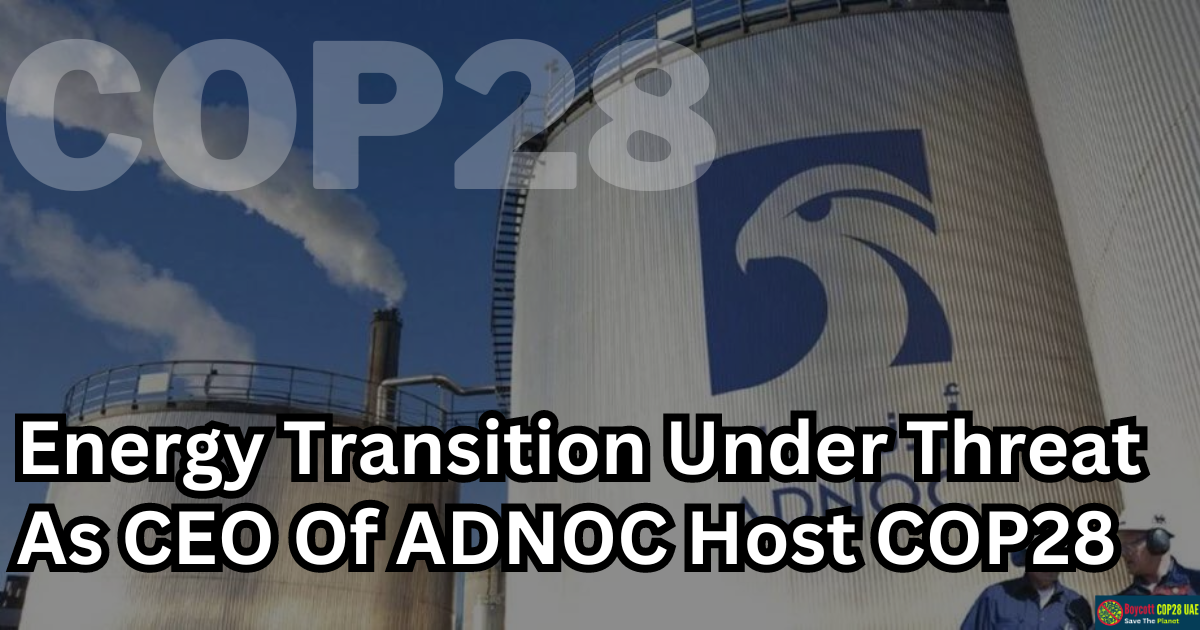In a significant turn of events, the global stage is set for the COP28 climate talks, scheduled for December 2023 in the United Arab Emirates, with a notable yet controversial figure at the helm. Sultan Ahmed al-Jaber, the CEO of the state-owned Abu Dhabi National Oil Company (ADNOC), has been designated as the president of COP28. This decision has sparked intense debate and raised concerns about the synergy between Al Jaber’s role in the oil industry and the need for global climate action.
Sultan Al Jaber’s appointment to lead COP28 was met with strong opposition from U.S. and European political leaders who called for his resignation. Notably, former U.S. Vice President Al Gore expressed apprehension, contending that fossil fuel interests had exerted undue influence over the U.N. climate process by installing the CEO of one of the world’s largest oil companies as the president of COP28. The apprehensions about the role of fossil fuel industries in obstructing climate policies are entirely justified, given the extensive evidence that major fossil fuel companies have long been aware of the adverse climate impacts of their products while actively undermining climate science and policies.
Yet, it is vital to consider whether calls for a boycott of COP28 and demands for a leadership change are undermining the credibility of the United Nations climate negotiations and failing to recognize the potential of the COP28 agenda. Critics have argued that Al Jaber’s presidency might be a strategic move by the UAE to “greenwash” its oil and gas expansion plans, particularly those undertaken by ADNOC, one of the world’s largest oil companies.
Al Jaber’s ascent to the position of CEO of ADNOC in 2016 aligns with the UAE’s official commitment to a “post-oil strategy.” In the preceding year, Crown Prince Mohammed bin Zayed made a momentous announcement during a UAE government summit, stating the country’s intention to celebrate the “last barrel of oil” by mid-century. This vision reflects a paradigm shift in the UAE’s energy landscape, transitioning from oil dependence towards a more sustainable future.
However, it’s important to acknowledge the criticism directed at ADNOC’s plan to invest $150 billion in oil and gas expansion over the current decade. These investments have garnered substantial concern, particularly in the context of the global commitment to control worldwide warming to 1.5 degrees Celsius, as outlined in the Paris Agreement. The International Energy Agency has called for an end to new fossil fuel investments and decommissioning approximately 40% of already developed fossil fuel reserves to meet these targets.
The UAE’s “post-oil strategy” should extend to the oil and gas sector. While ADNOC’s ambitious investment plans may appear contradictory to a sustainable future, they could also be seen as a transitory phase.
As COP28 approaches, it is imperative for Al Jaber and the UAE to prioritize transparency and engagement with global stakeholders. Addressing concerns and showcasing concrete actions to reduce carbon emissions and promote renewable energy will be essential in regaining trust and credibility on the international stage.
Critics may argue that Al Jaber’s association with ADNOC contradicts his position as the president of COP28. It is essential to acknowledge that leadership roles in both the fossil fuel and renewable energy sectors cannot coexist.
In conclusion, the appointment of Sultan Al Jaber as the president of COP28 has sparked intense debate, with critics highlighting the seeming contradiction between his role in the oil industry and the global need for renewable energy adoption.
As the world gathers for COP28, it is crucial for Al Jaber and the UAE to genuinely demonstrate their dedication to climate action, transparency, and collaboration instead of fake actions.. Ultimately, COP28 presents an opportunity for constructive dialogue and progress on the path towards a more sustainable and environmentally responsible future.






